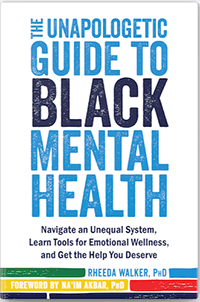
Rheeda Walker, Ph.D., has enjoyed a career brimming with accomplishments, from holding teaching positions at major universities and earning professional awards to signing book contracts. But Walker, a mental health researcher and author who recently joined the Wayne State University faculty as a psychology professor, notes that no achievement thrills her more than when her work makes a difference in people’s lives.
“I’m at a stage of my career where I want to take what I know off of the bookshelf and apply it in a way in which people can hear the message and translate it to their families,” said Walker, who will deliver a keynote address later this week at the annual American Psychological Association Convention, the largest conference in the nation for psychology professionals. “That has been the thing that’s been most personally gratifying for me: When I hear about people who say, ‘I got your book,’ or ‘I got it for a family member,’ or ‘we got the book as a family for the family reunion.’ That gives me chills!”
The author of The Unapologetic Guide to Black Mental Health, Walker has recently co-written a  book that she hopes will help voters manage stress stemming from the upcoming 2024 elections. That book, Calm in the Chaos: A Quick-Relief Guide for Managing Anxiety and Overwhelm in Loud and Uncertain Times, is slated to go on sale by early October and will be distributed exclusively by Barnes & Noble.
book that she hopes will help voters manage stress stemming from the upcoming 2024 elections. That book, Calm in the Chaos: A Quick-Relief Guide for Managing Anxiety and Overwhelm in Loud and Uncertain Times, is slated to go on sale by early October and will be distributed exclusively by Barnes & Noble.
Walker describes her upcoming book as “a resource to combat the overwhelming, emotional exhaustion and anxiety people will be feeling” during election season and beyond. Her arrival at Wayne State underscores the university’s continued commitment as part of its Prosperity Agenda to addressing and improving public health, physical and mental, in Detroit communities.
“The book is being published in anticipation of people needing new skills, strategies and tools to deal with what’s coming up,” said Walker, who most recently served as psychology professor and director of the Culture, Risk and Resilience Lab at the University of Houston. “The book will have broader appeal beyond election stress, but we know that, in today’s society, stress has been a real concern where voting is involved.”
Walker, who has appeared on national television programs such as the Today Show and Good Morning America and in newspapers such as The Washington Post, is also a co-author of the newly released No Racial Elephants in the Therapy Room, a book that aims to help psychology professionals better treat Black patients.
In The Unapologetic Guide, a significant portion of Walker’s work centers on the idea of assessing “psychological fortitude,” a term she coined to define and gauge a person’s capacity to manage emotions, particularly during stressful periods, and which Walker rates on a scale of 1 to 10. Walker observes that racial discrimination poses one of the greatest threats to Black psychological fortitude and, thus, mental health.
“We pursue a high level of psychological fortitude because it puts us in a better place emotionally,” she said. “And we have to recognize the importance of this in being able to navigate threats our mental health. In communities of color especially, threats can look like racism. Threats can look like sneaky microaggressions. I say ‘sneaky’ because the science has shown that microaggressions can be more harmful than overt racism, but most people don’t know that — and so measuring ‘psychological fortitude’ is the rating of the sum of these things.”
In addition to her keynote address, Walker will receive an award from the American Psychological Association Minority Fellowship Program for her contributions to research and will moderate an expert panel discussion.
